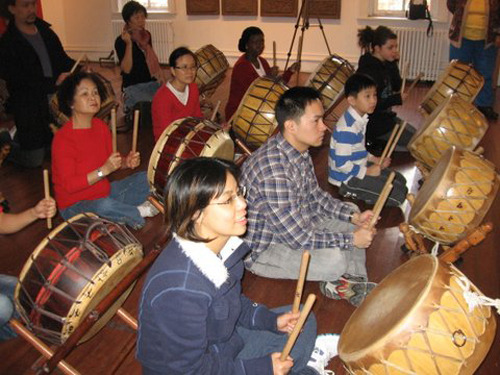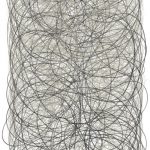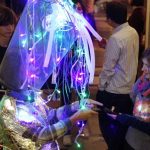Con Edison Immigrant Artist Program Newsletter, Issue No. 34
Featured Organization: Flushing Council on Culture and the Arts (FCCA)
Flushing Council on Culture and the Arts (FCCA) is an organization with an increasingly vital role in revitalizing the cultural and artistic identity of the borough of Queens. It achieves this mission in a number of ways and namely through its performing arts space, Flushing Town Hall. This Hall is a building rich with cultural history and a landmark of New York City, which FCCA now manages and operates on behalf of the city.
With the current economic climate, organizations like FCCA are faced with increasing challenges as institutions are re-evaluating the priority they place on the arts. Yet FCCA remains steadfast in preserving vital forms of art and culture. To this end, it provides services that range from artist workshops in public schools to career support for immigrant artists to the rental of gallery and performance space to folk artists.
Currently, Flushing Town Hall and the NYFA Folk Artist Development Program are working together to hold Workshops in Spring 2012 featuring master artists from the Andes, Mexico, and Puerto Rico. These artists are participants of the NYFA Folk Artist Development Program, fulfilling its second phase through these workshops. NYFA’s IAP Program Officer Karen Demavivas and Intern Dennis Han interview FCCA to highlight this exciting collaboration.
IAP: Please detail the prominence of FCCA and its performing arts space Flushing Town Hall (which is a cultural landmark) in New York City’s history. Can you speak about its cultural and artistic influence on the borough of Queens and the city as a whole?
FCCA: Flushing Town Hall has been a community gathering place since 1862. It was saved from demolition under the leadership of former Borough-President Claire Shulman. For over 30 years, Flushing Council on Culture and the Arts has been presenting the arts in Queens, with a long history of presenting jazz, in particular; and for the last 15 years managing and operating historic Flushing Town Hall on behalf of New York City, which owns the building. As the community continues to change dramatically around us, and many historic buildings are being demolished across the States, it becomes increasingly important for landmarks such as this one to be preserved for the future. The adaptive re-use of Flushing Town Hall as a center for arts and culture provides an exciting opportunity for audiences to see wonderful multidisciplinary performances in a unique setting.
IAP: Resources and services for immigrants are especially critical for newly arrived artists who navigate the daunting landscape of New York City. How has FCCA been a source of support to immigrant artists?
FCCA: FCCA invites immigrant artists (and all local artists) to sell their work in our gift shop and to apply for our space grant program. This program affords artists a free rehearsal space while the building is open and staffed. Artists have access to our two Steinway pianos, theater space, art room or gallery for free. In addition, FCCA will work with local folk artists to rent Flushing Town Hall for a greatly reduced rate, waiving the space rental fee and leaving the artists to only pay hard costs (i.e. set-up fees and security). FCCA recently offered this package to a local traditional Colombian artist for his CD release party. Finally FCCA is happy to provide technical assistance to immigrant artists who are writing grants for projects that will eventually be housed at Flushing Town Hall.

FCCA: Queens is the most diverse county in the United States with approximately 138 different languages spoken. FCCA strives to celebrate as many groups as possible with an array of public programs that engage particular communities while inviting all our neighbors to learn about the rich traditions that surround them. For example, FCCA’s annual Lunar New Year programs reflect the diversity of our Asian community. Our programs are often bi-lingual using English and the native language of our tradition bearers. Our work with master folk artists in the community often leads us to other artists. FCCA’s teaching artist Hsing- Lih Chou (master of Chinese calligraphy) has lead us to traditional Korean home cooks and Chinese Opera mask changers; and it was the leaders of the local Korean traditional drumming group that lead us to a Turkish weaver; all based in Queens! The space at Flushing Town Hall is well suited for the range of folk artists, we have a gallery, theater, art room, and industrial kitchen so we program traditional musicians, dancers, material artists, puppeteers, cooks, storytellers, and more. Now that folk artists know that they have an artistic home at Flushing Town Hall they also approach us with their programming ideas.
IAP: Economics aside, what are some challenges to FCCA’s commitment to being a revitalizing force and promoting the arts?
FCCA: Aside from economics, which is always the key factor in our concerns, some of our challenges to being a revitalizing force and promoting the arts include: significant changes in the demographics of Queens, which requires more resources to adequately and appropriately reach these new populations; new ways that people are accessing the arts via the internet (as opposed to “live” programming); and increased competition with sports and other leisure time activities. Also, schools are participating less in the arts across the country due to the economy and more pressure to teach to the tests.
IAP: Of the services that are offered at FCCA, your on-site workshops and placement of teaching artists in public schools stand out as ways in which your organization conducts outreach and focuses on community youth. Can you explain why these programs are important to your goals for enriching cultural and artistic outreach in Queens?
FCCA: FCCA believes in cultural arts equity; and we are keenly aware of the state of the economy and the arts in NYC schools. Our mission to be a revitalizing force in Queens and to be a creative catalyst for developing and promoting the visual and performance arts is realized through our Interactive Arts Workshops for Families and Teaching Residencies in Schools. Families have responded to these workshops with great enthusiasm. Families gravitate to these programs because they are rooted in celebratory traditions that they themselves grew up with. FCCA strives to keep these workshops free or low-cost so that they can be accessible to everyone. We also look to develop creative learning opportunities in the schools. Many of the students we serve in Queens are English Language Learners (ELL). These youngsters are pulled out of art and music classes for additional English classes. One of our most successful residencies uses the arts to assist ELL with their language skills. Teachers report that their ELL students are more engaged in the classroom. We have received similar feedback from our other residencies, which affirm that they develop creative learners.
IAP: Can you share some of the ways that artists, members of the community, and visitors to the borough can get involved with FCCA and Flushing Town Hall?
FCCA: Our special events including Jazz Jams, Jazz Clinics, Professional Development, Master Classes give professional artists opportunities to network and engage with Flushing Town Hall. Other special events including interactive workshops, lectures, demonstrations, and free community events provide general audience members with hands-on experience in the arts. Our Visual Artist Membership program offers our gallery space to exhibit the artists’ own work once a year as a members benefit. It affords them professional exposure and engages the artists with the community at large. In November 2011, FCCA formed the Korean Cultural Committee, composed of 30 members of the Korean community including artists, arts organizations, and arts advocates. This is a great way for the local Korean community to collaborate with FCCA to develop programming that speaks to their cultural needs.





